M2 Unit 2重点词组语法及相应练习题(含答案)解析
- 格式:doc
- 大小:52.00 KB
- 文档页数:16
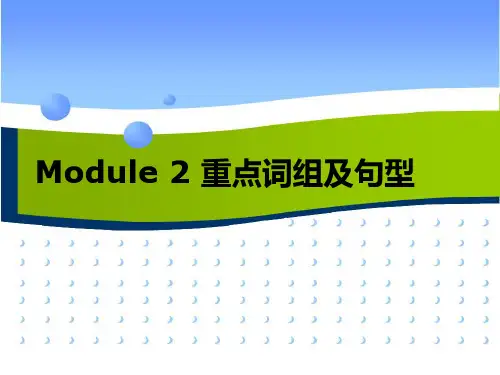
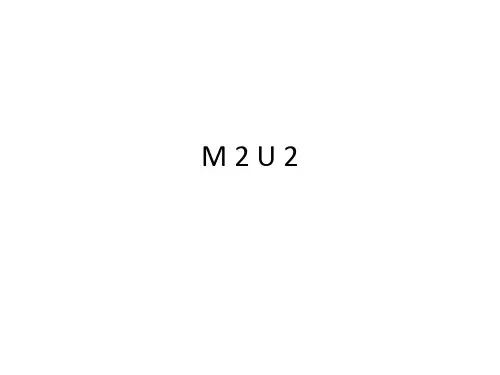
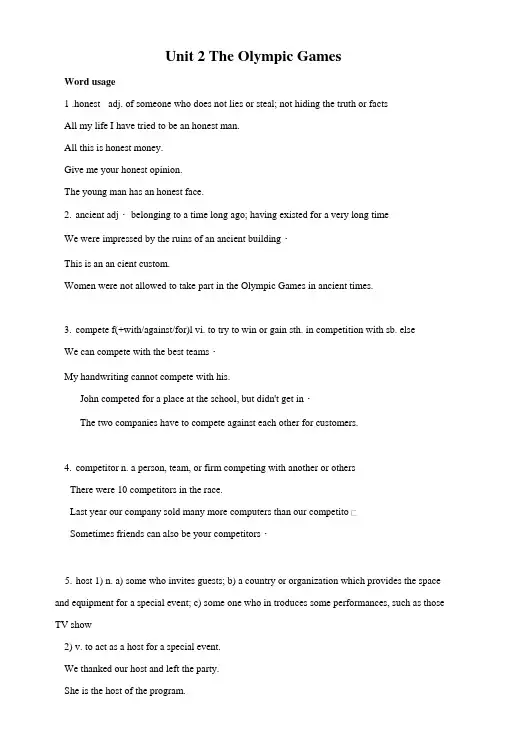
Unit 2 The Olympic GamesWord usage1 .honest adj. of someone who does not lies or steal; not hiding the truth or factsAll my life I have tried to be an honest man.All this is honest money.Give me your honest opinion.The young man has an honest face.2.ancient adj・ belonging to a time long ago; having existed for a very long timeWe were impressed by the ruins of an ancient building・This is an an cient custom.Women were not allowed to take part in the Olympic Games in ancient times.pete f(+with/against/for)l vi. to try to win or gain sth. in competition with sb. elseWe can compete with the best teams・My handwriting cannot compete with his.John competed for a place at the school, but didn't get in・The two companies have to compete against each other for customers.petitor n. a person, team, or firm competing with another or othersThere were 10 competitors in the race.Last year our company sold many more computers than our competito匚Sometimes friends can also be your competitors・5.host 1) n. a) some who invites guests; b) a country or organization which provides the space and equipment for a special event; c) some one who in troduces some performances, such as those TV show2) v. to act as a host for a special event.We thanked our host and left the party.She is the host of the program.It remains unknown which country will host the international tennis tournament.We attended a dinner party hosted by the president of the company.Bejing will host the 29th Olympic Games in 2008.6.Greek 1) adj. from or connected with Greece 2) n. a) [C] a person from Greece; b) [U] the language of GreeceThe director of the film is a Greek.My friend speaks French and Greek・7.magical adj・ mysterious, strange, and excitingYou can enjoy the magical view over the calm waters of the bay・There is always a magical evening beneath the bright stars.In the story, Sam has a magical hat.8.interview 1) n. a) a meeting where a person is asked questions to decide whether they should be given a job or a place on an educational course;b) a meeting where a person is asked questions to find out about their actions or opinions, sometimes broadcast on radio or TV or printed in a newspaper or magazine2) v. to ask sb. questions in an interviewDon't be late (or your interview, or you worfl get the job.We are now going to interview the Minister of Education.She has interviewed most of the applicants for the job.9.admit vi & [vt. (that \ doing )] 1) to agree, often unwillingly, that sth. bad or unpleasant is true;2) to allow ab・ \ sth. to enter a place; 3) to allow sb.\ sth. to join a club or organization 1 admitted breaking the window.You must admit the task to be difficult・There were no windows to admit air.No one but ticket-holders was admitted.He was admitted by Beijing University.10.salve 1) n. a) a person who is owned by another person and must work for them; b) a slaveto sth. \ of sth: a person completely under the control of a particular thing2) vi. to work hardThere were more slaves than citizens in ancient Athens.They are all slaves to fashion.He is a slave t o drink・She slaved for him all her life.I have been slaving away all weekend in the garden.11.replace v. 1) to put sth. back where it was; 2) to take the place of sb. \ sth; 3) to changeone thing for another that is newer or better.The brakes have to be replaced.Electric lights have replaced candles.You will have to replace those old computers・12・ prize 1) n. sth. of value given to someone who is successful in a game, race, or given for some action that is admired;2) adj・ a) [only before a noun] that has gained a prizeTo some men wealth is the greatest prize in life.His poem won the first prize in the contest.I will use the prize money to help pay for my educatio n.13.silver l)n. [U] a soft precious metal, grayish-white in color, that can be brightly polished,and is used in jewellery and for making coins2) adj. a) made of silver; b) grayish-white or silver in colorIn ancient times, the emperors5 bowls were made of silver. There is not a silver hair on her head ・ There is a silver ring in the box・14.physical adj. 1) concerning the body rather than the mind; 2) concerning the material thingsthat you can see and touch;3) [always before a noun] concerning the natural formation of the Earth's survace; 4) according tothe law of naturePlaying basketball is a form of physical exercise・These are physical changes while those are chemical changes.I have no idea how large the physical universe is.There may be a physical explanation for these strange happenings・15.root 1) n. a) the part of a plant that grows down into the soil in search of food and water;b) the part of a tooth, hair, or organ that holds 让to the rest of the body; c) thecentral part or cause of sth; d) one's roots: the place where one grew up.2) v. to make or get rootsThese plants have very deep roots・This is the root cause of poverty.Some people believe that money is the root of all evil.Where is your roots?Do roses root easily?16.relate v. 1) to make a connection between two things; 2) to tell a stoiyrelate to sth: to concern or be connected with slh.relate to someone: to understand someone and have a comfortable relationship withthemCan you relate what happened in your childhood to your present state of mind?We related our troubles to him, asking his advice.I don't know to what this relates.She doesn f t relate well to her mothe匚17.poster n. a large printed notice or picture put up in a public placeThey put up posters all round the town advertising their products.1& advertise vt & vi. 1) to tell the public about sth, such as an event, service, or article for sale,for example in a newspaper or on TV; 2) to ask for someone or sth. by placinga notice somewhere like a newspaper or shop windowIf you want to sell your product you must advertise it.I advertised my house in the "Daily News"・The company is advertising for typists in the newspapers・19- promise 1) n. a) [C] a statement that you certainly will or will not do sth・b) [U] signs or hope of success or improvement2) v. to state that you will certainly do sth.Give me your promise that you'll never be late again.The young man shows promise as a poet.He promised to help us.Useful expressions1 .take part inAre you going to take part in the first experiment?I don't want to take part in this kind of activity・He took part in the football game yesterday.2.a set ofa group ofOn the shelf there was a set of Lu XurTs book.There is a set of rules you must follow if you are going mountain-climbing.I bought a set of furniture last week.3.as well as 也;和.... 一样好Many students as well as Tom were present at the meeting・We shall travel by night as well as by day・He cooks as well as his mother does.4.change one^s mindchange one^s idea \ what one has decidedHe is planning to travel alone and nothing will change his mind.1 have spoken for an hour but they haven^t changed their mind.You can never change his mind after he makes a decision.Unit 2 The Olympic Games %1.请根据中文意思完成下列句子。
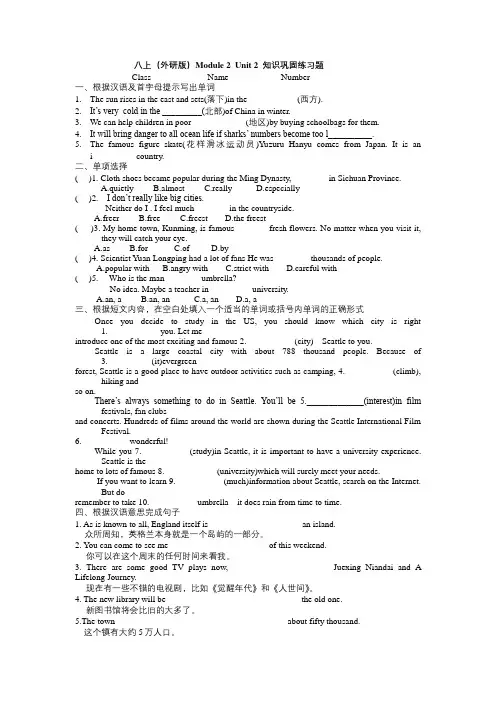
八上(外研版)Module 2 Unit 2 知识巩固练习题Class_____________Name____________Number___________一、根据汉语及首字母提示写出单词1.The sun rises in the east and sets(落下)in the ___________(西方).2.It’s very cold in the _________(北部)of China in winter.3.We can help children in poor ____________(地区)by buying schoolbags for them.4.It will bring danger to all ocean life if sharks’ numbers become too l__________.5.The famous figure skate(花样滑冰运动员)Y uzuru Hanyu comes from Japan. It is ani__________country.二、单项选择( )1. Cloth shoes became popular during the Ming Dynasty, ________in Sichuan Province.A.quietlyB.almostC.reallyD.especially( )2.---I don’t really like big cities.---Neither do I . I feel much________in the countryside.A.freerB.freeC.freestD.the freest( )3. My home town, Kunming, is famous________fresh flowers. No matter when you visit it, they will catch your eye.A.asB.forC.ofD.by( )4. Scientist Yuan Longping had a lot of fans He was ________thousands of people.A.popular withB.angry withC.strict withD.careful with( )5. ---Who is the man ________umbrella?---No idea. Maybe a teacher in__________university.A.an, aB.an, anC.a, anD.a, a三、根据短文内容,在空白处填入一个适当的单词或括号内单词的正确形式Once you decide to study in the US, you should know which city is right1.____________you. Let meintroduce one of the most exciting and famous 2.___________(city)---Seattle to you.Seattle is a large coastal city with about 788 thousand people. Because of3.__________(it)evergreenforest, Seattle is a good place to have outdoor activities such as camping, 4.___________(climb), hiking andso on.There’s always something to do in Seattle. You’ll be 5._____________(interest)in film festivals, fan clubsand concerts. Hundreds of films around the world are shown during the Seattle International Film Festival.6.___________wonderful!While you 7.___________(study)in Seattle, it is important to have a university experience.Seattle is thehome to lots of famous 8.____________(university)which will surely meet your needs.If you want to learn 9.___________(much)information about Seattle, search on the Internet.But doremember to take 10.___________umbrella---it does rain from time to time.四、根据汉语意思完成句子1. As is known to all, England itself is___________ __________an island.众所周知,英格兰本身就是一个岛屿的一部分。

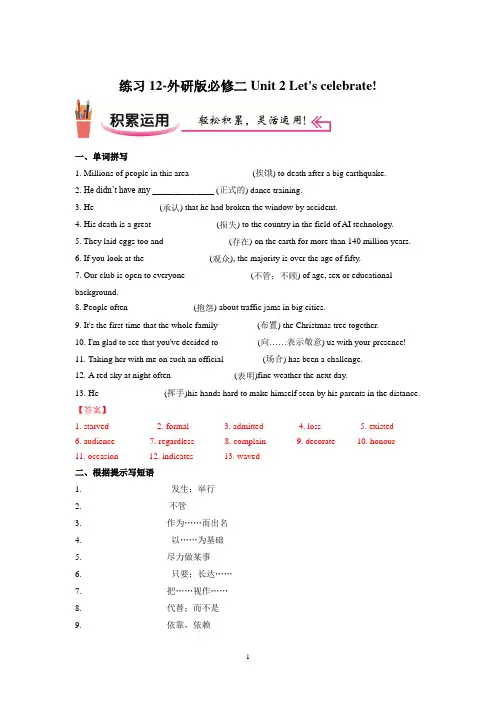
练习12-外研版必修二Unit 2 Let's celebrate!一、单词拼写1. Millions of people in this area ______________(挨饿) to death after a big earthquake.2. He didn’t have any ______________ (正式的) dance training.3. He ______________ (承认) that he had broken the window by accident.4. His death is a great ______________ (损失) to the country in the field of AI technology.5. They laid eggs too and ______________ (存在) on the earth for more than 140 million years.6. If you look at the ______________ (观众), the majority is over the age of fifty.7. Our club is open to everyone ______________ (不管;不顾) of age, sex or educational background.8. People often ______________ (抱怨) about traffic jams in big cities.9. It's the first time that the whole family ________ (布置) the Christmas tree together.10.I'm glad to see that you've decided to ________ (向……表示敬意) us with your presence!11.Taking her with me on such an official ________ (场合) has been a challenge.12.A red sky at night often ______________(表明)fine weather the next day.13.He ______________ (挥手)his hands hard to make himself seen by his parents in the distance. 【答案】1. starved2. formal3. admitted4. loss5. existed6. audience7. regardless8. complain9. decorate 10. honour11. occasion 12. indicates 13. waved二、根据提示写短语1. __________________ 发生;举行2.__________________ 不管3. __________________ 作为……而出名4. __________________ 以……为基础5. __________________ 尽力做某事6. __________________ 只要;长达……7. __________________ 把……视作……8. __________________ 代替;而不是9. __________________ 依靠,依赖10. __________________ 注意11. __________________ 喜爱,渴望12. __________________ 清理13. __________________ 与……无关14. __________________ 闲坐15. __________________ 盼望,期待【答案】1. take place2. regardless of3. be known as4. be based on5. try to do sth.6. as long as7. regard...as...8. instead of9. depend on10. pay attention to11. be keen on12. clean up13. have nothing to do with14. sit around15. look forward to三、词形转换1.decoration n. 装饰物→_____________vi. & vt. 装饰;装修2.freedom n. 自由,自由权利→_____________adj. 自由的3.participate v. 参加,参与→_____________ n. 参加;参与4.limitless adj.无限的→_____________n.(常作复数)范围→limited adj.有限的plain v. 抱怨;不满;发牢骚→_____________ n. 抱怨6.warning n. 警告,警示,告诫→_____________ v. 警告7.indicate v. 表明,显示→_____________ n. 迹象;表示;标示8.attract v. 吸引,引起……的兴趣→_____________ adj.有吸引力的;吸引人的→_____________ n. 吸引;吸引力petition n. 比赛,竞赛→_____________vi.比赛;竞争→_____________n. 竞争者→competitive adj.有竞争力的10.admit v. (不情愿地)承认→_____________ n. 承认;认可11.loss n. 失去,丧失→_____________ vt.失去;丢失→_____________adj.丢失的;迷失的12.retired adj.退休的→_____________vi.& vt.(使)退休→_____________n. 退休13.exist v. 存在,实际上有→_____________n. 存在【答案】1.decoration n. 装饰物→decorate vi. & vt. 装饰;装修2.freedom__n. 自由,自由权利→free adj. 自由的3.participate v. 参加,参与→participation n. 参加;参与4.limitless__adj.无限的→limit n.(常作复数)范围→limited adj.有限的plain__v. 抱怨;不满;发牢骚→complaint n. 抱怨6.warning n. 警告,警示,告诫→warn v. 警告7.indicate v. 表明,显示→indication n. 迹象;表示;标示8.attract v. 吸引,引起……的兴趣→attractive adj.有吸引力的;吸引人的→attraction n. 吸引;吸引力petition n. 比赛,竞赛→compete vi.比赛;竞争→competitor n. 竞争者→competitive adj.有竞争力的10.admit v. (不情愿地)承认→admission n. 承认;认可11.loss n. 失去,丧失→lose vt.失去;丢失→lost adj.丢失的;迷失的12.retired adj.退休的→retire vi.& vt.(使)退休→retirement n. 退休13.exist v. 存在,实际上有→existence n. 存在四、单句语法1.You should not talk with a person with your finger ____________(point) at him.2.With all these ____________(attract), no wonder tourism is increasing wherever there is a Disneyland.3.She has been looking forward to ____________(have) a chance to pay a visit to Zhangjiajie.4.It is requested that some measures ____________(take) to stop “white pollution”.5.Most men prefer ____________(spend) the weekends at home rather than go shopping.6.The project’s aim is to clean ____________polluted areas in th e world.7.Festive paper _____________ (decorate) had been hung from the ceiling.8.I explained that each person has different ideas of what ________ (free) is.9.We held a _____________ (celebrate) to celebrate her birthday.10.The Dragon Boat Festival is in memory ________ a Chinese poet.11.She _____________ (complain) that no one had been at the airport to meet her.12.He finally won his _____________ (free) after twenty years in jail.【答案】1.pointing2. attractions3. having4. (should) be taken5. to spend6.up7. decorations8. freedom9. celebration 10. of11. complained 12. freedom五、课文填空Every Christmas, Tolkien’s children would get an envelope, inside 1.____________ there was a handwritten letter from Father Christmas. These letters from Father Christmas were indeed written by Tolkien, one of the most famous 2.____________(name) in English literature. In this way, Tolkien 3.____________(keep) Father Christmas alive for his four children.The letters told wonderf ul stories about Father Christmas’s life and adventures at the North Pole with 4.____________regular character, Polar Bear. In a letter, Father Christmas5.____________(complain) about his helpers who played games with the toys instead of6.____________(wrap) them up.7.____________(interesting), Tolkien didn’t warn his children that they might not receive presents8.____________ they were not good. The letters did, however, change as his children got9.____________(old). From these letters, we can share the true spirit of giving at Christmas time. Tolkien’s love and care 10.____________ his children made him very like Father Christmas.【答案】1.whichs3.kept4.aplained6.wrapping7.Interestingly8.if9.older 10.for六、完形填空When my wife, Jane, and I were 16, we were in the same class. About a week before Thanksgiving Day, we found out that our teacher Edward was having some 1 challenges. We wanted to do something to help, so as a class we 2 to gather food, clothing and gifts to 3 his family had a good Thanksgiving Day.When Jane told her family about our plan, her mother was 4 . Together they searched their house for things they could 5 . Her mother went to the kitchen, 6 a big turkey and saying, “Thanksgiving Day won’t be 7 without a turkey dinner.” To this day, Jane remembers how moved she was by her mother’s 8 .Before making our 9 , we said a prayer of appreciation for the wonderful 10 to help others. I will never forget the surprised 11 of our teacher and his wife when they 12 the door; their four children gathered around them as we handed out the gifts. It was a cold night; we all felt warm inside, 13 .Last month while I was in a meeting, my secretary informed me, “Your high school teacher Mr. Edward is wondering if you could 14 him a few minutes. He’s sitting in your office right now!”I left my meeting and went to my office 15 . My teacher and I hugged and began to16 the last 42 years. He told me he 17 remembered that cold winter night when webrought the 18 of Thanksgiving Day to his family. The food and gifts were certainly appreciated, 19 what warmed his heart that night was to see a group of teenagers who understood the 20 of Thanksgiving Day.1.A.financial B.personal C.academic D.typical 2.A.applied B.determined C.attempted D.preferred 3.A.figure out B.point out C.make sense D.make sure 4.A.satisfied B.puzzled C.amazed D.touched 5.A.separate B.donate C.distribute D.collect 6.A.breaking up B.breaking down C.pulling out D.pulling down 7.A.complete B.usual C.traditional D.basic 8.A.honesty B.generosity C.pity D.curiosity 9.A.decision B.contact C.delivery D.contribution 10.A.opportunity B.gift C.deal D.memory 11.A.impression B.sorrow C.expression D.laugh 12.A.pushed B.reached C.dragged D.answered 13.A.again B.anyhow C.though D.enough 14.A.wait B.spare C.spend D.save 15.A.hurriedly B.nervously C.proudly D.worriedly 16.A.come up with B.look back on C.keep up with D.get hold of 17.A.just B.even C.still D.already 18.A.experience B.excitement C.pleasure D.warmth 19.A.and B.or C.but D.so20.A.spirit B.symbol C.history D.intention【答案】1-5 ABDDB6-10 CABCA11-15 CDCBA16-20 BCDCA【分析】文章讲述了作者和同学们在感恩节给老师送去食物和礼物,帮助老师度过经济困难,感恩精神温暖了彼此内心。
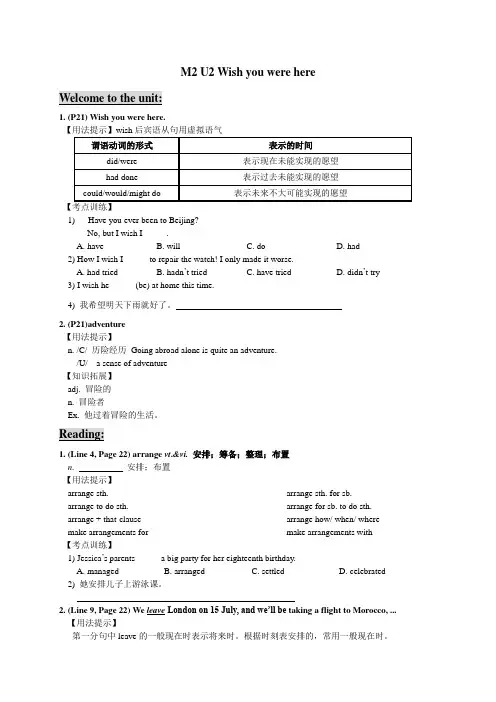
M2 U2 Wish you were here1. (P21) Wish you were here.【考点训练】1) --- Have you ever been to Beijing?--- No, but I wish I _____.A. haveB. willC. doD. had2) How I wish I _____ to repair the watch! I only made it worse.A. had triedB. hadn’t triedC. have triedD. didn’t try3) I wish he _____ (be) at home this time.4) 我希望明天下雨就好了。
2. (P21)adventure【用法提示】n. /C/ 历险经历Going abroad alone is quite an adventure./U/ a sense of adventure【知识拓展】adj. 冒险的__________n. 冒险者__________Ex. 他过着冒险的生活。
_________________________________1. (Line 4, Page 22) arrange vt.&vi.安排;筹备;整理;布置n. 安排;布置【用法提示】arrange sth. arrange sth. for sb.arrange to do sth. arrange for sb. to do sth. arrange + that-clause arrange how/ when/ where make arrangements for make arrangements with【考点训练】1) Jessica’s parents _____ a big party for her eighteenth birthday.A. managedB. arrangedC. settledD. celebrated2) 她安排儿子上游泳课。
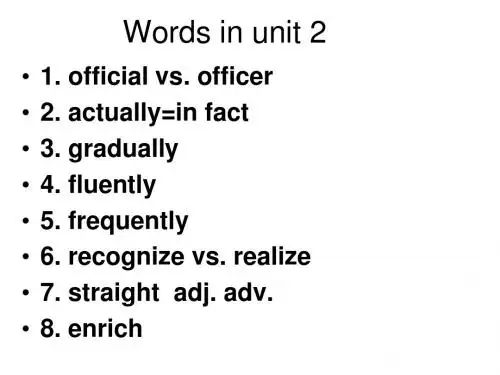
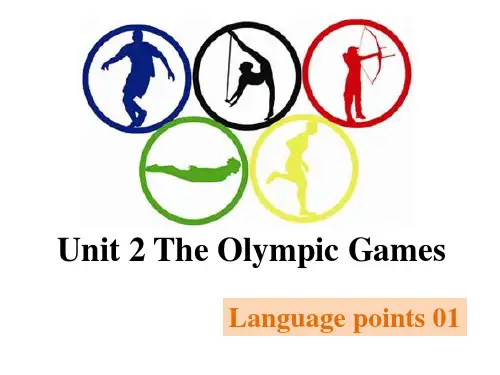

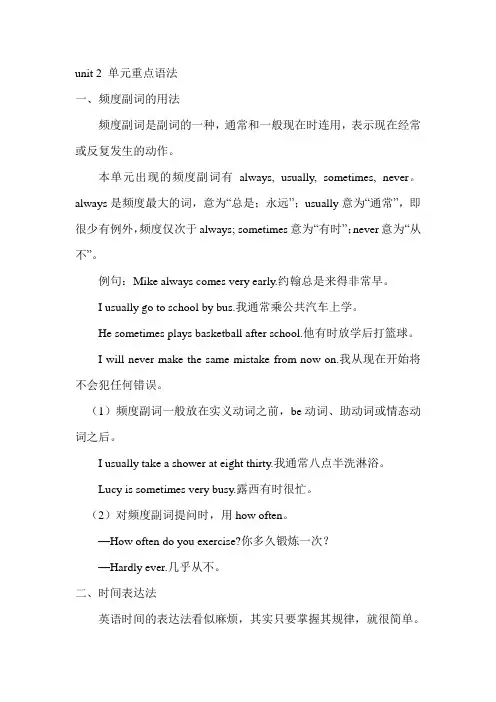
unit 2 单元重点语法一、频度副词的用法频度副词是副词的一种,通常和一般现在时连用,表示现在经常或反复发生的动作。
本单元出现的频度副词有always, usually, sometimes, never。
always是频度最大的词,意为“总是;永远”;usually意为“通常”,即很少有例外,频度仅次于always; sometimes意为“有时”;never意为“从不”。
例句:Mike always comes very early.约翰总是来得非常早。
I usually go to school by bus.我通常乘公共汽车上学。
He sometimes plays basketball after school.他有时放学后打篮球。
I will never make the same mistake from now on.我从现在开始将不会犯任何错误。
(1)频度副词一般放在实义动词之前,be动词、助动词或情态动词之后。
I usually take a shower at eight thirty.我通常八点半洗淋浴。
Lucy is sometimes very busy.露西有时很忙。
(2)对频度副词提问时,用how often。
—How often do you exercise?你多久锻炼一次?—Hardly ever.几乎从不。
二、时间表达法英语时间的表达法看似麻烦,其实只要掌握其规律,就很简单。
1.整点表达法:表示几点钟即整点时用“基数词+o'clock”来表示,其中o'clock可以省略。
例如:7:00 读作:seven o'clock或seven5:00读作:five o'clock或five2.顺读法:这种方法是“先读钟点数,再读分钟数”。
例如:8:25读作:eight twenty five9:40读作:nine forty3.逆读法:这种方法是“先读分钟,再读点钟”。
必修第二册Unit 2(词、短语、句型语法、写作)复习外研版(2019)一、核心词汇(注意单词的变化)1.Don't respond to any e-mails __________(要求) personal information, no matter how official they look. 2.I decide to make more __________ (努力) to improve my English as soon as possible.3.Reading her biography, I was lost in admiration for what Doris Lessing had achieved in __________ (文学).4.As we can't agree on this matter, let's have a __________ (投票) on it.5.The paper was used for sealing up holes in walls and__________s(屋顶) in the past.6.The year's __________ (收成) is better than any previous year's.7.The cartoon shows a common __________ (现象) nowadays that children are the focus of families. 8.She wants to buy a handbag, not __________ (别致的) but strong.9.Shaking hands with others is one of the most common ways of greeting others on some __________ (正式的) occasions.10.At the end of the party, we thanked the__________ (主人) and went back home.11.__________ (成人) need to live their own lives, but it's difficult for children.12.As soon as we finished the song, all the __________ (听众) gave us warm applause.13.If you can live __________ (在海外), where would you like to live?14.Nowadays, __________ (公民) are advised not to go out without wearing masks.15.It is known to us that a large number of ocean animals died from __________ (全球的) warming. 16.At the railway station, the mother __________ (挥手)goodbye to her daughter until the train disappeared from view.17.If you go to the post office, could you buy me some __________ (信封) and stamps?18.Young children sometimes can't tell the difference between __________ (幻想,想象) and reality. 19.Are you feeling happy when you share your __________ (喜悦) with others?20.Li Bai was a very famous __________ (诗人) in Tang Dynasty, who wrote many wonderful poems such as To Wang Lun.21.The __________ (软件) downloaded from the Internet must be installed properly.二、拓展词汇:1.__________ v.向……表示敬意→__________ adj.可敬的;光荣的2.__________ n.装饰物→__________ v.装饰;装修;布置;美化3.__________ n.自由,自由权利→__________ adj.自由的4.__________ v.参加,参与→__________ n.参加;参与→__________ n.参加者5.__________ n.(社会上的)不平等→__________ adj.平等的→__________ n.平等→__________ ad v.平等地6.__________ adj.无限的→__________ n.(常作复数)范围→__________ adj.有限的7.__________ adj.频繁的,经常的→__________ ad v.有规律地;定期地;经常地8.__________ v.抱怨,不满,发牢骚→__________ n.抱怨9.__________ n.警告,警示,告诫→__________ v.警告10.__________ adj.挨饿的,即将饿死的→__________ v i.& v t.(使)饿死,挨饿→__________ n.饿死;挨饿11.__________ v.表明,显示→__________ n.迹象;表示;标示12.__________ v.吸引,引起……的兴趣→__________ adj.有吸引力的;吸引人的→__________ n.吸引;吸引力13.__________ n.比赛,竞赛→__________ v i.比赛;竞争→__________ n.竞争者→__________ adj.有竞争力的14.__________ n.场合,时刻→__________ adj.偶尔的,偶然的→__________ ad v. 偶然地;不时地15.__________ v.(不情愿地)承认→__________ n.承认;认可16.__________ n.失去,丧失→__________ v t.失去;丢失→__________ adj.丢失的;迷失的17.__________ adj.退休的→__________ v i.& v t.(使)退休→__________ n.退休18.__________ v.存在,实际上有→__________ n.存在→__________ adj.现存的,现行的19.__________ n.国籍;民族→__________ n.国家;民族→__________ adj.全国的;民族的;国家的20.__________ v.互动→__________ n.互动→__________ adj.互动的,交互式的三、词及词形应用(语法填空):1.(1)Tom warned us __________ the serious situation in that country, and told us not to go there to travel.(2)We've just heard a __________ (warn) on TV that a heavy rain may be on the way.(3)My father warned me not __________ (go) to the seaside where it was crowded with tourists.(4)My father warned me __________ going to the seaside where it was crowded with tourists.2.There __________ an old hospital at the corner, but no one knows when it came into __________.(exist) 3.(1)Yuan Longping is honoured __________ the father of Chinese hybrid rice.(2)It is __________ (honour)to earn a living with your own hands.4.(1)His wife is always complaining __________ his laziness.(2)Not a single person has made __________ (complain) to the manager about the poor quality of the food so far.5.We're going to have a __________ (compete) to see who can swim the farthest in our class.6.The tourist__________ is so __________ that it __________ a great many visitors every year.(attract) 7.Many citizens __________ in the anti-smoking campaign and most of the __________ said their __________ was voluntary.(participate)8.(1)When I came in, I saw her sitting in the sofa __________ (lose) in thought.(2)Surrounded by people's misunderstanding, he was __________ a loss what to say to justify himself. 9.The organization will hold an event to help the __________ (starve) children in Africa.10.Gaining __________ (admit) to a key university is seen as a key to future success for some parents. 四、重点短语1.__________ 使……继续存在2.__________ 与……一样长;只要3.__________ 把……视作……4.__________ 不管,不顾5.__________ 把……寄给/到……6.__________ 抱怨7.__________ (用纸、布等)包,裹8.__________ 喜爱;热衷于;渴望9.__________ 出去吃10.__________ 与……无关11.__________ 在某人看来五、短语应用(根据以上短语完成下列句子)1.He serves the public heart and soul, __________ his personal gain or loss.2.He is always __________ the working conditions though he seldom works hard.3.In many countries, a good education __________ the key to success in the future.4.I don't like maths, but I __________ history.5.He asked a lot of questions, most of which __________ his study.六、重点句型(语法)[句型1]“This/That is why...”意为“这/那就是……的原因/为什么……”__________(那就是……的原因)Letters from Father Christmas could be the perfect book for those who regard Christmas as a special time of year.[仿写1]汤姆病了。
M2 U2 短语归纳
1. 在非洲的冒险 the adventures in Africa 2. 在非洲美丽的草原上 in the beautiful grassland of Africa 3. 在澳大利亚著名的海滩上 on Australia’s famous beaches 4. 挑战自我 challenge oneself 5. 去跋涉 go trekking 6. 坐在上面不舒服 be uncomfortable to sit on 7. 忙于做某事 be busy doing sth 8. 我等不及了 I can’t wait! 9. 骑骆驼旅游 travel on camels/the camel ride 10. 大约美国的大小 about the size of the USA 11. 睡袋 sleeping bag 12. 救生衣 life jacket 13. 在月光明朗的夜晚 on clear nights 14. 在黑暗中 in the dark 15. 沿尼罗河而下 travel down the River Nile 16. 去激浪漂流 go whit-water rafting 17. 穿特制的服装 wear special clothing 18. 以免,防止 in case 26. 随着空气变的稀薄而感觉不舒服 feel sick as the air gets thinner
27. 靠近 up close 28. 随意友好的问候 a casual and friendly greeting
29. 到处 here and there 30. 回顾 refer back to 31. 出差 a business trip/be on business 32. 文化节 cultural holiday 33. 害怕做 be scared to do sth 34. 听起来令人激动/有趣 sound exciting/fun
35. 期待 look forward to 36. 发现 make a discovery 37. 四处张望 look around 38. 值得做 be worth doing Word power 39. 自言自语 think to oneself 40. 带上额外的衣服 take extra clothes 41. 保暖 keep warm 42. 结实的靴子 strong boots 43. 生火 make a fire 44. 迷路 lose one’s way 19. 翻转过来 get turned upside down 20. 食物和水的供应 supplies of food and water
21. 沿着大型动物的足迹 follow the footprints of the big animals
22. 尽可能的接近 get as close as possible
23. 为。。。。担心 worry about/be worried about
24. 吓跑。。。scare ….away 25. 继续迁移去。。。move on to
45. 用完,用尽 run out 46. 带上急救包 take a first aid kit on his trip. Grammar and usage 47. 一段时间 a period of time 48. 作出礼貌的询问 make polite enquires 49. 就某事采访某人 interview sb. about sth. 50. 写一份关于…的报告 write a report about
51. 我六月的日程满了 My schedule for June is full. 52. 比平时早 earlier than usual 53. 看日出 watch the sunrise 54. 正要做… be about to do sth. 55. 天气报告 weather report 56. 因为…而失望 be disappointed at 57. 放弃 give up 58. 落到地面上 fall down to the ground 59. 黎明时分 at dawn 60. 完全的沉默 in total silence
75. 窗外相同的景色 the same view out of your window 76. 做些研究 do some research 77. 制作一份旅游宣传单 make a travel leaflet
78. 做…的机会 the chance to do sth. 79. 定期的航班 regular flight 80. 延伸到天边 reach to the sky 81. 完美的世界 perfect world 82. 得到/赢得…的名称 take/win the name of
83. 就…的辩论/争辩 argument about/over 61. 太阳升起时美景 watch the beautiful pinks and yellows of the sunrise Task 62. 大陆的名称 the name of the continent 63. 去旅行社 go to the travel agent’s 64. 河上的观光 take a river cruise 65. 在山脚下 at the foot of the mountain 66. …的出生地 the birthplace of … 67. 稍做休息 relax a little bit 68. 在灌木丛中跋涉 trek through the bush 69. 坐缆车下山 Go down the mountain by cable car. 70. 颠倒顺序 invert the order 71. 选择假期的目的地 choose a holiday destination 72. 输入E-mail地址 type in the e-mail address 73. 接近动物 get close to the animals Project 74. 厌倦… be tired of 84. 永远保持年轻 stay young forever 85. 被…覆盖 be covered with 86. 高过 tower over 87. 宣称,断言 claim that…/to do sth. 88. 构成;一幅美丽的图画 form a beautiful picture 89. 使得任何观光者无以言表 make any viewer speechless 90. 被…包围 be surrounded by 91. …的栖息地,家园 be home to 92. 为…提供 provide… for…. 93. 藏语 Tibetan language 94. 一个普通的英语单词 a common English language 95. 在最温和的时候 at its mildest 96. 一天经历四季 experience four seasons in one day 97. 省略 leave out 98. 利用,使用 make use of
99. 剩下的… the rest of … 100. 你的宣传单的版面设计 the layout of your leaflet 词汇讲解 1. adventure adventurous adj. 喜欢冒险的 充满冒险 adventurer 冒险家 1 n ① 作可数名词,意思是 冒险经历 She told me about her adventures in Africa(他在非洲的冒险经历. ② 作不可数名词,意思是冒险 Our life is full of adventure.我们的生活充满着惊险和刺激。 年轻人总喜欢冒险。The young are always fond of adventure. ③ 作定语 Adventure stories/films 2 vt. 意思是拿…冒险,使…冒风险 不要拿你的生命去冒险 Don’t adventure your life. vi. 冒险,企图侥幸(on/upon) 那些冒险家在一些不为人知的大海里冒险。 Those explorers adventured on some unknown seas. 她总喜欢在遥远的地方冒险。She likes adventuring in remote place. 2. astonishing adj. “惊人的,令人惊讶的” astonished adj. “感到惊讶的”常做表语。 Astonish vt. 使惊讶 astonishment n. 惊讶 这个消息是令人震惊的 The news was astonishing. 这个消息使每个人都感到震惊 The news astonished everyone. 当她听到这个消息的时候很震惊。She looked astonished when she heard the news. 使我震惊的是,她完全消失了。To my astonishment, it disappeared completely. 3. envy vt & n妒忌。羡慕;妒忌对象 envy sb. sth. 妒忌或羡慕某人某事 feel envy at …对……感到妒忌或羡慕 out of envy 出于妒忌 become the envy of …成为……羡慕的对象 Lucy was good-looking, rich and clever, so all her friends envied her.露西长得漂亮,家庭富有,人又聪明,所以她的朋友们都妒忌她.
“How I envy you!” said Tom.汤姆说:”我多么羡慕你啊!” 4. worth 表示“价值……”的意思时,常与表示金钱的名词连用;表示“值得……”的意思时,常与doing连用。它一般用作表语,有以下三个句型:
sth. be worth +money(the price 价值…… sth. be (well worth doing sth.(很)值得做…… It is worth (one’s while to do sth./doing sth.值得某人花时间做某事 It’s well worth making great efforts to learn English well.很值得花时间把英语学好。 =It’s worth our while to learn/learning English well. 5. remind vt“使(人)想起,使记起,提醒”,经常用于以下结构: remind sb. of sth. remind sb. to do sth. remind sb. that-clause The report reminded him of his bitter past.这个报告使他想起了他辛酸的往事。 I kept on reminding myself that the time was short and the task was heavy.我不断提醒自己时间紧、任务重。